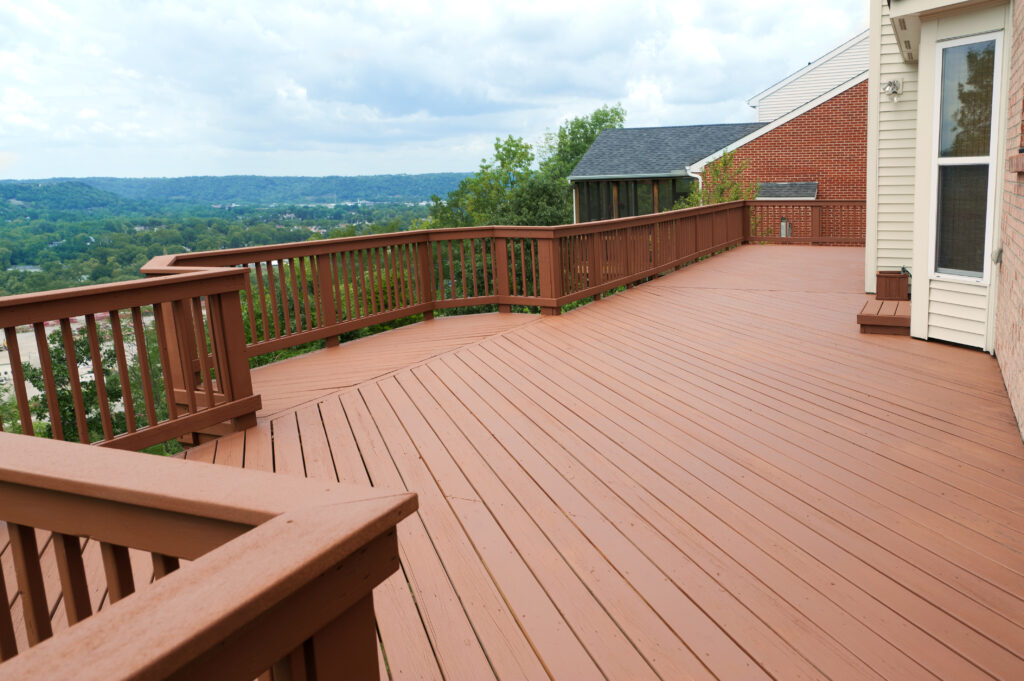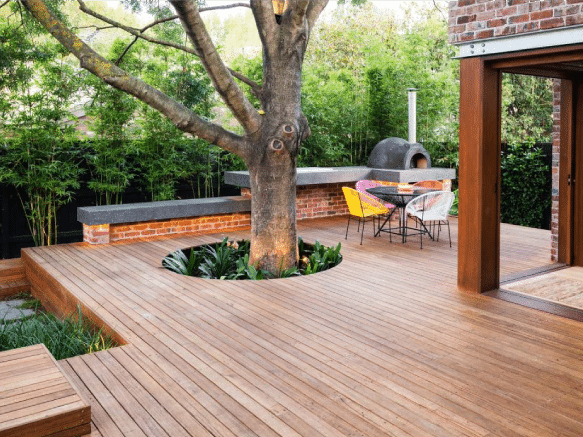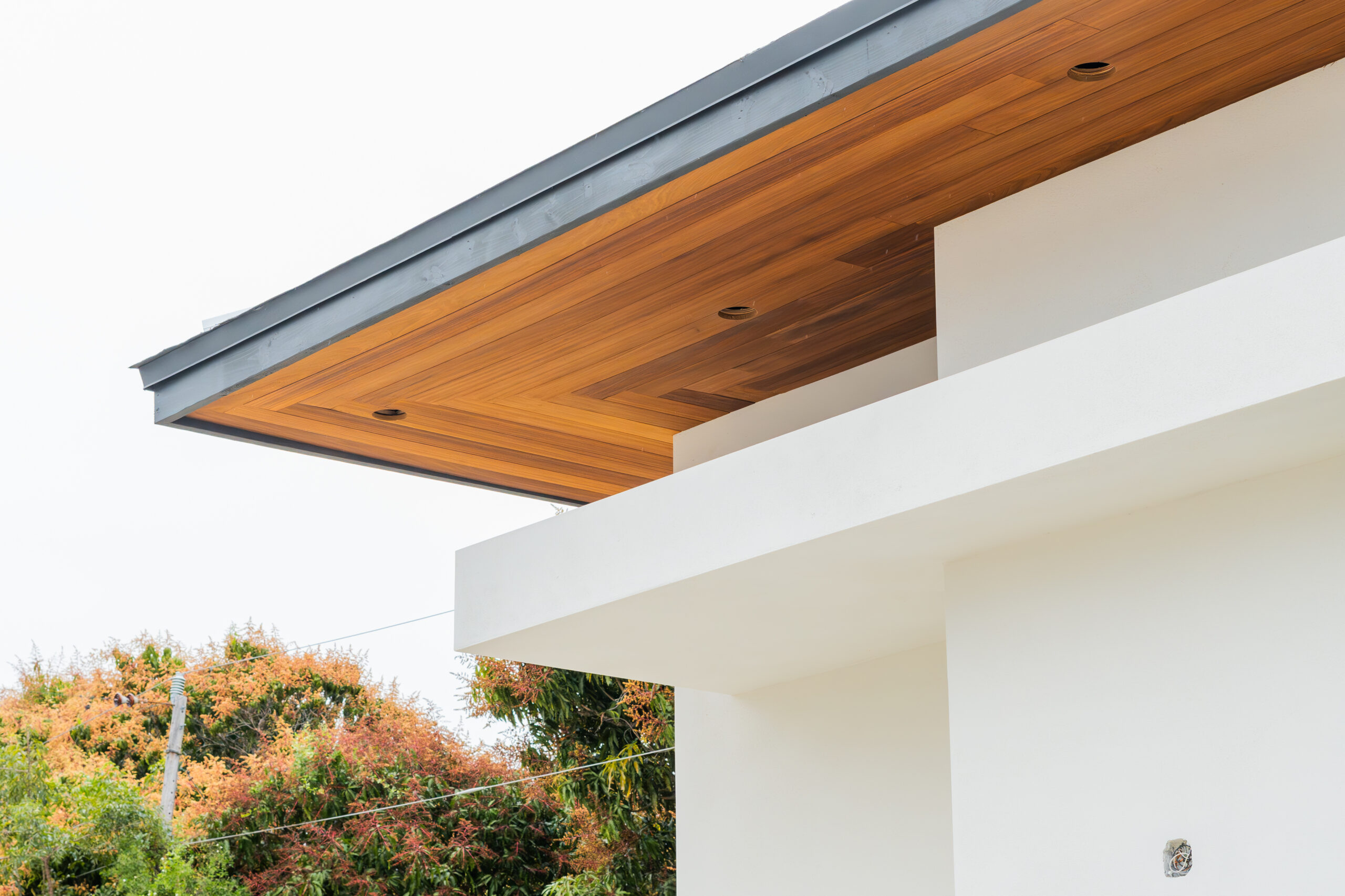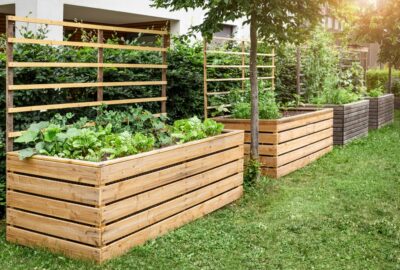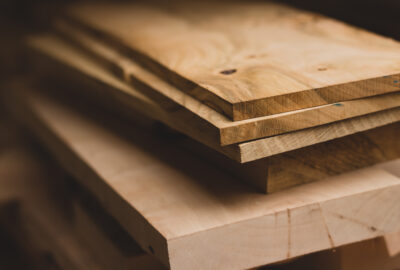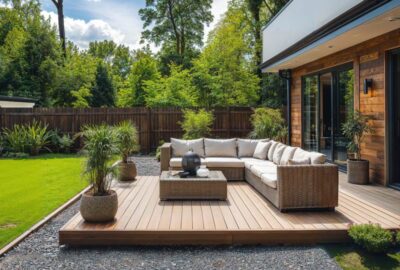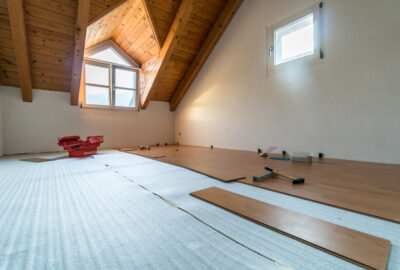Decking Materials, Hardwood, Deck
Top 5 Brazilian Hardwood Species for Building Your Dream Deck
When it comes to building your dream deck, the choice of material plays a crucial role in ensuring the structure’s longevity, beauty, and overall functionality. Brazilian hardwoods are widely considered some of the best materials for outdoor decking. Known for their impressive strength, durability, and rich aesthetic appeal, Brazilian hardwoods offer a premium option for homeowners looking to enhance their outdoor spaces.
Brazilian hardwoods are particularly favored because of their natural ability to withstand harsh environmental conditions, including high humidity, extreme sunlight, and heavy rainfall. These hardwoods also offer remarkable resistance to pests, decay, and rot, making them an ideal choice for decking. However, selecting the best Brazilian hardwood for your project requires understanding the unique qualities of each species.
In this guide, we will explore the Top 5 Brazilian Hardwood Species for Decking. Each species has its own set of benefits, characteristics, and aesthetic appeal, and this comprehensive overview will help you make an informed decision about which one is right for your dream deck.
Why Brazilian Hardwood for Decking?
Brazilian hardwoods have earned a reputation as one of the most durable and beautiful decking materials available. Here are a few reasons why Brazilian hardwoods stand out from other materials:
- Durability: Brazilian hardwoods are incredibly tough, and they can endure the wear and tear of daily use, even in high-traffic areas. They are resistant to scratches, dents, and the effects of weathering, making them a long-lasting investment for your deck.
- Resilience to Weather: These hardwoods are known for their natural resistance to moisture, mold, rot, and even pests like termites, which is particularly beneficial for outdoor environments where wood can be exposed to various weather conditions.
- Natural Beauty: Brazilian hardwoods come in a wide range of colors, from rich browns to reddish tones, with intricate grain patterns that add a unique and luxurious look to your deck.
- Sustainability: Many Brazilian hardwoods are harvested from sustainably managed forests, making them an eco-friendly choice when sourced responsibly.
Now, let’s dive into the Top 5 Brazilian Hardwood Species for Decking.
Top 5 Brazilian Hardwood Species for Deck Building
1. Ipe (Brazilian Walnut)
Ipe, also known as Brazilian Walnut, is one of the most well-known and popular hardwood species used in decking. It is renowned for its strength, dense composition, and rich color, making it a favorite among homeowners who want a high-quality deck that will last for decades.
Features of Ipe
- Color: Ipe features a deep, reddish-brown to dark brown color, often accompanied by golden or olive undertones. Over time, the wood will naturally develop a weathered, silver-gray patina when left untreated, but this can be prevented with regular maintenance.
- Hardness: Ipe is one of the hardest woods in the world, making it highly resistant to scratches, dents, and impacts. It has a Janka hardness rating of 3680, which is nearly twice as hard as oak.
- Durability: Ipe is extremely durable and can last over 50 years with proper care. It is highly resistant to mold, rot, and insects, making it ideal for outdoor conditions, especially in humid or rainy climates.
Why Choose Ipe for Decking?
- Longevity: Ipe is known for its ability to withstand the test of time. Its strength and durability mean that your deck can last for decades without showing signs of wear and tear.
- Low Maintenance: While it requires some upkeep to preserve its rich color, Ipe is still considered low-maintenance compared to other decking materials. Regular cleaning and oiling will keep it looking great.
- Eco-Friendly: Sustainable sourcing is important when selecting hardwoods. When harvested from responsibly managed forests, Ipe is a great eco-friendly decking option.
If you’re looking for a deck that combines beauty, strength, and longevity, Ipe is an excellent choice.
2. Brazilian Cedar (Cedro)
Brazilian Cedar, or Cedro, is another popular option for decking. It’s lighter than Ipe, making it easier to handle and install. Brazilian Cedar offers a warm, reddish-brown color and a pleasant aroma, making it a great choice for those who want both aesthetic appeal and functionality.
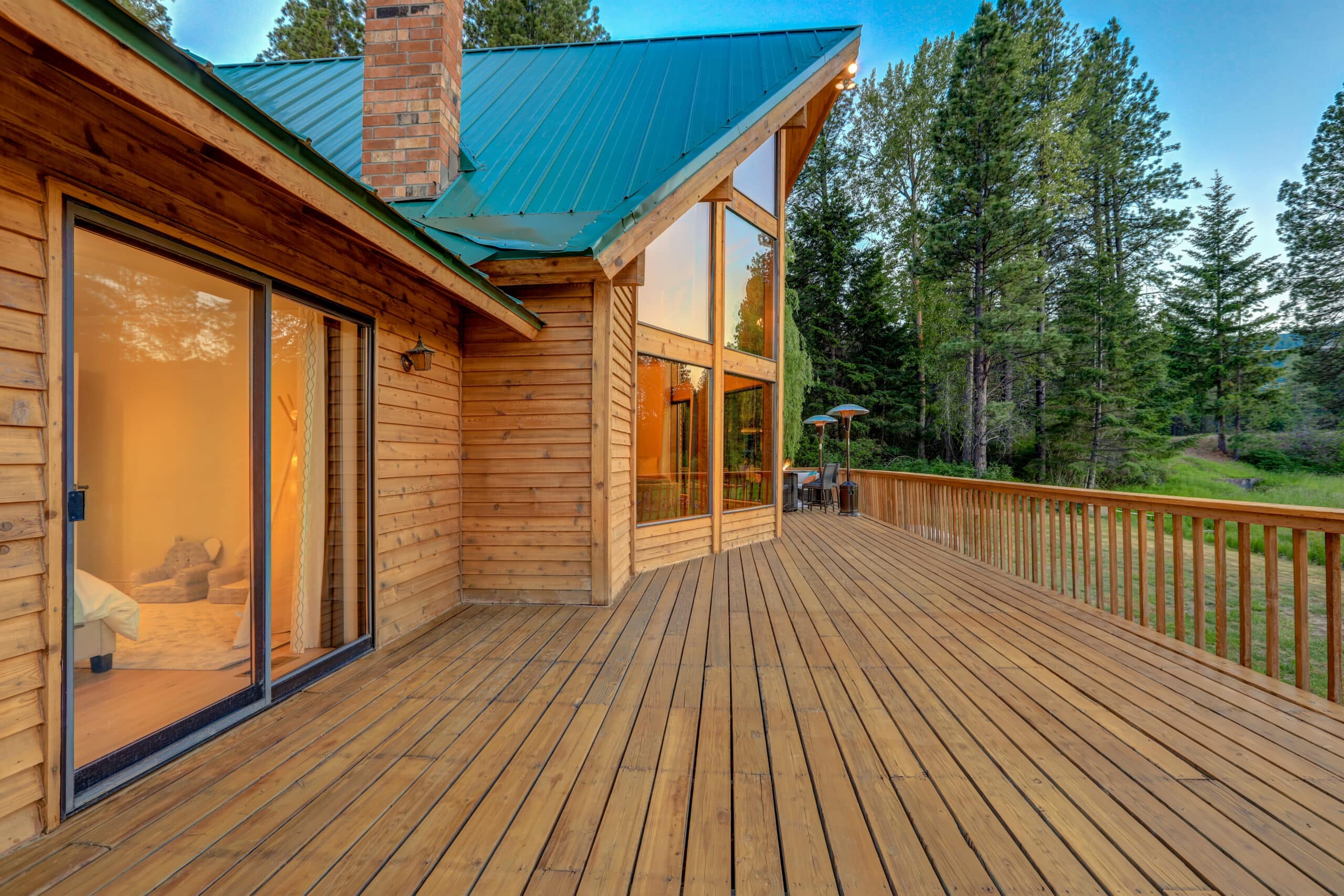
Features of Brazilian Cedar
- Color: Brazilian Cedar typically has a reddish-brown color, though it can also have hints of yellow or brown. Over time, it naturally fades to a grayish tone when left untreated.
- Aromatic: One of the standout features of Brazilian Cedar is its natural aroma, which repels insects and adds to the wood’s appeal. This makes it an excellent choice for decking in areas where pests are a concern.
- Hardness: While it’s not as hard as Ipe, Brazilian Cedar is still a durable wood for decking. It has a Janka hardness rating of around 1,140, making it suitable for residential applications.
Why Choose Brazilian Cedar for Decking?
- Insect Resistance: Brazilian Cedar is naturally resistant to insects, including termites, which makes it ideal for areas that may be prone to pest issues.
- Aesthetic Appeal: The rich, reddish hues of Brazilian Cedar, combined with its unique aroma, create a welcoming and warm outdoor space.
- Sustainability: Many suppliers offer responsibly sourced Brazilian Cedar, so you can feel good about choosing this wood for your decking.
Brazilian Cedar is a great option for those looking for a wood that’s beautiful, durable, and naturally resistant to pests.
3. Cumaru (Brazilian Teak)
Cumaru, also known as Brazilian Teak, is a highly durable and versatile hardwood that’s perfect for decking. It combines the beauty of traditional teak with the superior durability of Brazilian hardwoods.
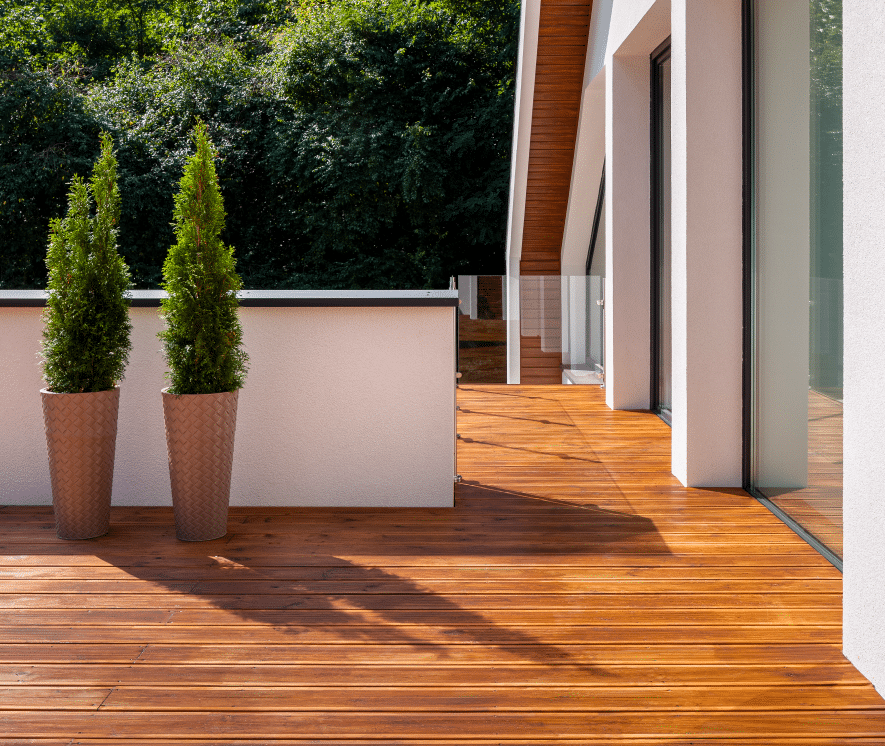
Features of Cumaru
- Color: Cumaru has a rich, golden-brown to reddish-brown color with dark streaks running through it. The wood darkens with age, and over time, it develops a beautiful, silver-gray patina if exposed to the elements.
- Hardness: Cumaru is a dense and hard wood, with a Janka hardness rating of 3,330, making it resistant to scratches, dents, and other forms of damage.
- Durability: Like many Brazilian hardwoods, Cumaru is resistant to rot, mold, and insect infestations. It can withstand a wide range of weather conditions, including heavy rain and humidity.
Why Choose Cumaru for Decking?
- Teak-Like Aesthetics: If you love the look of traditional teak wood but want something more affordable, Cumaru is a great option. It provides a similar rich aesthetic at a fraction of the cost.
- Strength and Durability: With its high Janka hardness rating, Cumaru is an incredibly strong wood that can withstand heavy foot traffic and harsh environmental conditions.
- Eco-Friendly: When sourced responsibly, Cumaru is an environmentally friendly decking choice that supports sustainable forest management.
Cumaru is a fantastic option for those who want the elegance of teak without the high price tag, combined with excellent durability and resilience.
4. Tiete Rosewood (Brazilian Rosewood)
Tiete Rosewood, or Brazilian Rosewood, is a high-end hardwood that offers luxurious beauty and exceptional strength. This wood is ideal for homeowners who want to create a stunning and unique outdoor deck.
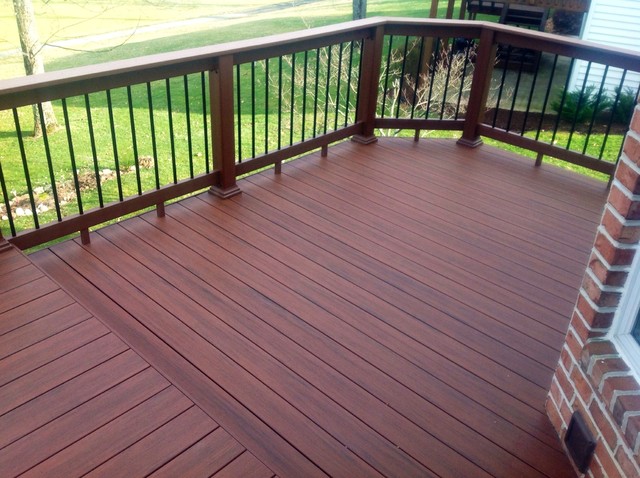
Features of Tiete Rosewood
- Color: Tiete Rosewood has a rich, reddish-brown to purple hue, with dark streaks and intricate grain patterns. It darkens over time and develops an even more luxurious appearance as it ages.
- Hardness: Tiete Rosewood is extremely dense and hard, with a Janka hardness rating of 2,960. It is resistant to impact and can withstand high traffic areas without showing significant signs of wear.
- Durability: Tiete Rosewood is resistant to rot, mold, and decay, making it a great option for outdoor use. Its natural oils help protect it from insects and other pests.
Why Choose Tiete Rosewood for Decking?
- Luxury and Aesthetics: Tiete Rosewood’s rich color and beautiful grain patterns make it a stunning option for a high-end deck. It’s perfect for homeowners who want to create an elegant, sophisticated outdoor space.
- Exceptional Durability: This wood is incredibly hard and durable, ensuring that your deck will look great for years to come.
- Eco-Friendly: Like other Brazilian hardwoods, Tiete Rosewood can be sustainably sourced, making it an eco-conscious decking option when harvested responsibly.
Tiete Rosewood is perfect for creating a luxurious and long-lasting deck that will impress your guests and stand the test of time.
5. Jatoba (Brazilian Cherry)
Jatoba, or Brazilian Cherry, is another excellent Brazilian hardwood known for its stunning reddish color and exceptional durability. It’s one of the most popular hardwoods for decking due to its strength and visual appeal.
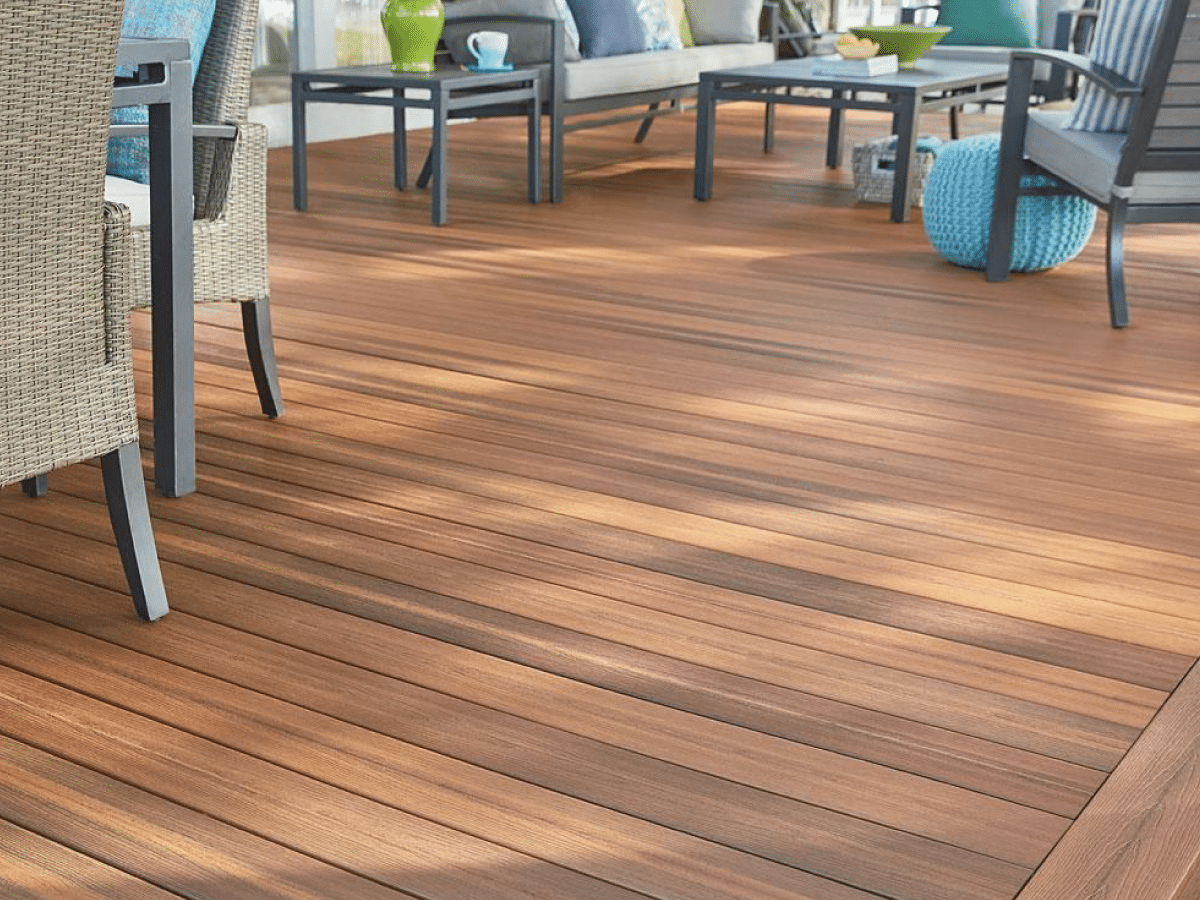
Features of Jatoba
- Color: Jatoba features a rich reddish-brown color with golden undertones. It darkens slightly over time, developing a deeper tone that adds warmth and richness to your outdoor space.
- Hardness: Jatoba is one of the hardest hardwoods, with a Janka hardness rating of 2,690. It is highly resistant to impact and wear, making it ideal for high-traffic areas.
- Durability: Jatoba is incredibly durable and resistant to rot, decay, and insect damage. It can withstand exposure to moisture and fluctuating temperatures, making it perfect for outdoor decks.
Why Choose Jatoba for Decking?
- Warmth and Elegance: The deep, reddish hues of Jatoba provide a rich and inviting atmosphere for your deck, creating a luxurious outdoor space.
- Longevity: Jatoba is a tough, durable wood that can last for many years with proper care and maintenance.
- Eco-Friendly: When sourced responsibly, Jatoba is an environmentally friendly choice, helping to protect the rainforest while providing you with a beautiful, long-lasting decking material.
Jatoba is a top choice for homeowners who want a beautiful and durable deck that will enhance their outdoor living space.
Comparing The Top 5 Brazilian Hardwood For Decking
| Property | Ipe (Brazilian Walnut) | Brazilian Cedar | Cumaru (Brazilian Teak) | Tiete Rosewood (Brazilian Rosewood) | Jatoba (Brazilian Cherry) |
| Color | Dark brown with reddish hues | Reddish-brown with golden undertones | Golden brown to reddish-brown | Reddish-brown to purple with dark streaks | Rich reddish-brown with golden undertones |
| Hardness (Janka Rating) | 3680 | 1140 | 3330 | 2960 | 2690 |
| Durability | Very high, resistant to moisture, rot, and insects | Moderate to high, resistant to moisture and decay | Very high, resistant to rot, mold, and insects | Very high, resistant to moisture and decay | High, resistant to rot and insects |
| Maintenance | Low maintenance (oil treatment needed) | Moderate maintenance (regular oiling recommended) | Low maintenance | Low maintenance | Moderate maintenance (oil treatment recommended) |
| Pest Resistance | High resistance | Naturally repels insects | High resistance | High resistance | Moderate resistance |
| Sustainability | Sustainable when sourced responsibly | Sustainable when sourced responsibly | Sustainable when sourced responsibly | Sustainable when sourced responsibly | Sustainable when sourced responsibly |
| Price Range | $$$ | $$ | $$$ | $$$$ | $$ |
Tips for Choosing the Right Brazilian Wood for Decking
When choosing the best Brazilian hardwood for your deck, keep these factors in mind:
1. Climate Considerations
For dry, hot climates, Ipe and Cumaru are great choices. For humid or rainy areas, Brazilian Cedar and Ipe perform well.
2. Look and Color
If you want dark tones, Ipe and Tiete Rosewood are perfect. For lighter hues, go for Brazilian Cedar or Cumaru.
3. Strength and Durability
Ipe and Cumaru are the toughest woods, ideal for high-traffic areas, while Brazilian Cedar and Jatoba are a bit softer but still durable.
4. Maintenance Needs
Ipe and Cumaru are low-maintenance, while Brazilian Cedar and Jatoba require more upkeep to preserve their color.
5. Sustainability
Choose -certified Brazilian hardwoods to ensure they are sourced sustainably, including Ipe.
6. Budget
Ipe and Tiete Rosewood are higher-end options, while Brazilian Cedar and Cumaru are more affordable yet still durable.
7. Availability
Ipe and Cumaru are commonly available, while rarer species like Brazilian Cedar may require special orders.
Conclusion
Choosing the right Brazilian hardwood for your deck is crucial to ensuring both beauty and longevity. The Top 5 Brazilian Hardwood Species for Decking – Ipe, Brazilian Cedar, Cumaru, Tiete Rosewood, and Jatoba, each offer their own unique benefits and characteristics. Whether you’re looking for strength, aesthetic appeal, or resistance to weather, these hardwoods provide excellent options for building a deck that will last for decades.
By selecting the right hardwood species, you can create a deck that not only enhances the beauty of your outdoor space but also withstands the test of time. Whichever Brazilian hardwood you choose, you can rest assured that you’re investing in a material known for its durability, beauty, and natural resilience.
Comments are closed



